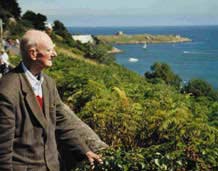
|
Doc gazing over Killiney Bay from the Vico Road, Co Dublin, Ireland. ©Rory Clarke |
Francophile Ireland sails on
On 3 June a memorial service was held for Doctor John de Courcy Ireland in Monkstown Church, Dublin. He died on 4 April, aged 94. High-level political and naval representatives attended from France, China, Britain and Ireland. Doc Ireland's passing had already sparked a flood of writing and broadcasting about this truly remarkable man, his achievements and how he inspired almost everyone he met.
How to sum up such a full life in a short article? Rather than start with the sea, as most writers do, let's begin with France. Sure enough, the French have always embraced the sea and listened to Doc as they would his good friend, Jacques Cousteau.
Doc was a great traveller, loved many countries and mastered many languages, as he joked, to converse with "the lovely mermaids in all those ports I visited". Though raised in Ireland by his grandmother, he was educated in England. He won a scholarship to Oxford at 17, but ran away on a Dutch cargo ship bound for Argentina instead.
He was born in India. His father, a British army major, had been assassinated in Beijing in 1914 and his mother remarried there. He stayed in close contact with China, promoted relations between the two countries and was awarded the Ambassador of Friendship in 2002. Fittingly, Chinese ambassador Zhang Xinsen attended the June memorial.
But with Huguenot blood coursing his veins, Doc loved France most of all, for its history, culture and, yes, that différence. What would we do without the French? he would boom, as the foreign media decried yet another strike or singular political manoeuvre from Paris. And France loved Doc back, feting him with honours, including from the prestigious Académie de la Marine. As French ambassador to Ireland, Frédéric Grasset, put it to me at the memorial service, "I have come not just out of duty, but friendship and my own love of the sea".
Several other governments honoured Doc as well -Argentina, Portugal, Spain, the UK and Yugoslavia. But until his death, the Irish government was deafeningly silent about his work, despite his contribution to the Maritime Institute and museum, the lifeboat, and tireless work to improve working conditions at sea and promote the country's marine heritage.
Doc had already had a full life when I first met him at Newpark School in 1980. He thrived from teaching, and it was now his job, already approaching 70, to give this disparate gaggle of pupils a final leg-up into university, or rather as it turned out, the world. For most of us, he succeeded, and became a good friend too. He would listen, learn, teach and motivate, what Brazilian writer Paolo Freire would describe as the ideal teacher-student.
Doc was also a well-known political activist and anti-sectarian nationalist who campaigned hard for social justice, often with his wife Betty (late 1999) whom he married in 1937. However, his innate fairness, intellectual independence and determined honesty left him isolated and vulnerable to some farcical mistreatment, as beautifully illustrated when he was sidelined by the Labour Party in the 1940s "red alert", partly on suspicion of his unusual name, only to be later expelled from the Communist party for his anti-Soviet views.
The sea was Docs destiny. He loved its mystical character, as reflected in his favourite song, Jean Ferrat's Raconte-moi la mer, which he popped on for us at school. Walk with him along the Vico Road and he would soon gaze out over the bay and become lost in memories of people, encounters, countries. He respected the sea's immense power, and its unforgiving response to a sloppy ships command, the true reason behind his linguistic mastery.
Doc loved conversation and debate. In 1982 he hosted a programme on RTE radio about his life. I was among the guests. Why had Ireland, an island, virtually turned its back on the sea? Doc asked. Even landlocked Switzerlands merchant navy was bigger. How many Dublin restaurants faced the sea? One, a hotel bar almost perched over his local Dalkey Sound, has since been demolished.
Could it be that fish was our penance? ventured a guest. Jim Kemmy, a leftwing politician from Limerick, saw it simpler: he, like many compatriots, came from Terra Ferma. And the Ferma (firmer) it is, the less the Terra (terror).
Doc was a fit man. Once when he was already well over 70, I remember him bounding ahead of me as we ran for his train in Paris-St Lazare, suitcase in hand. But what really keeps a person going is mental alertness: Doc read and wrote prolifically, and always kept up correspondence. He never complained about growing old, except after an occasional blindness attack. But the scourge of age eventually bit into his mind, particularly after he was taken into care. Doc was a free spirit, and despite very kind staff, he felt as though in an oubliette, far from his beloved pale marine dawns. He lasted nearly two years. In a rare lucid moment towards the end, he sighed, "sometimes you wonder what it's all about. You really do."
One evening, Doc dozed off, with his daughter by his side. This is it, she thought, when suddenly he roused and started to whisper to her, in French. It was one of their last conversations. Two days later Doc finally fell asleep for good. Rory Clarke
Some reading
Books by John de Courcy Ireland include: The History of Dun Laoghaire Harbour, The Admiral from Mayo, Ireland's Sea Fisheries, and Ireland and the Irish in Maritime History. He also completed a to-be-published autobiography.
See also various articles and tributes by Lorna Siggins, Irish Times correspondent and author.
©Real Terms 2006.
This article also appeared in The Eyes, a Paris-based magazine, under the pen name of RJ Doyle.
blog comments powered by Disqus